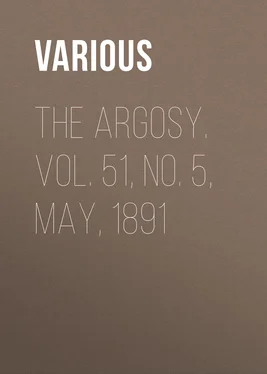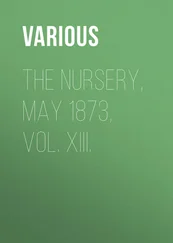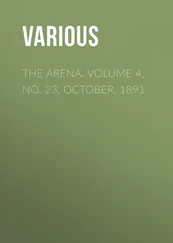Various - The Argosy. Vol. 51, No. 5, May, 1891
Здесь есть возможность читать онлайн «Various - The Argosy. Vol. 51, No. 5, May, 1891» — ознакомительный отрывок электронной книги совершенно бесплатно, а после прочтения отрывка купить полную версию. В некоторых случаях можно слушать аудио, скачать через торрент в формате fb2 и присутствует краткое содержание. Жанр: foreign_antique, periodic, foreign_edu, на английском языке. Описание произведения, (предисловие) а так же отзывы посетителей доступны на портале библиотеки ЛибКат.
- Название:The Argosy. Vol. 51, No. 5, May, 1891
- Автор:
- Жанр:
- Год:неизвестен
- ISBN:нет данных
- Рейтинг книги:5 / 5. Голосов: 1
-
Избранное:Добавить в избранное
- Отзывы:
-
Ваша оценка:
- 100
- 1
- 2
- 3
- 4
- 5
The Argosy. Vol. 51, No. 5, May, 1891: краткое содержание, описание и аннотация
Предлагаем к чтению аннотацию, описание, краткое содержание или предисловие (зависит от того, что написал сам автор книги «The Argosy. Vol. 51, No. 5, May, 1891»). Если вы не нашли необходимую информацию о книге — напишите в комментариях, мы постараемся отыскать её.
The Argosy. Vol. 51, No. 5, May, 1891 — читать онлайн ознакомительный отрывок
Ниже представлен текст книги, разбитый по страницам. Система сохранения места последней прочитанной страницы, позволяет с удобством читать онлайн бесплатно книгу «The Argosy. Vol. 51, No. 5, May, 1891», без необходимости каждый раз заново искать на чём Вы остановились. Поставьте закладку, и сможете в любой момент перейти на страницу, на которой закончили чтение.
Интервал:
Закладка:
Janet took the letter with reverent tenderness. Lady Chillington's trembling fingers pointed out the lines she was to read. Janet read as under:—
"P.S.—I have reserved my most important bit of news till the last, as lady correspondents are said to do. Observe, I write 'are said to do,' because in this matter I have very little personal experience of my own to go upon. You, dear mum, are my solitary lady correspondent, and postscripts are a luxury in which you rarely indulge. But to proceed, as the novelists say. Some two years ago it was my good fortune to rescue a little yellow-skinned princekin from the clutches of a very fine young tiger (my feet are on his hide at this present writing), who was carrying him off as a tit-bit for his supper. He was terribly mauled, you may be sure, but his people followed my advice in their mode of doctoring him, and he gradually got round again. The lad's father is a Rajah, immensely rich, and a direct descendant of that ancient Mogul dynasty which once ruled this country with a rod of iron. The Rajah has daughters innumerable, but only this one son. His gratitude for what I had done was unbounded. A few weeks ago he gave me a most astounding proof of it. By a secret and trusty messenger he sent me—But no, dear mum, I will not tell you what the Rajah sent me. This letter might chance to fall into other hands than yours (Indian letters do sometimes miscarry), and the secret is one which had better be kept in the family—at least for the present. So, mother mine, your curiosity must rest unsatisfied for a little while to come. I hope to be with you before many months are over, and then you shall know everything.
"The value of the Rajah's present is something immense. I shall sell it when I get to England, and out of the proceeds I shall—well, I don't exactly know what I shall do. Purchase my next step for one thing, but that will cost a mere trifle. Then, perhaps, buy a comfortable estate in the country, or a house in Park Lane. Your six weeks every season in London lodgings was always inexplicable to me.
"Or shall I not sell the Rajah's present, but offer myself in marriage to some fair princess, with my heart in one hand and the G.H.D. in the other? Madder things than that are recorded in history. In any case, don't forget to pray for the safe arrival of your son, and (if such a petition is allowable) that he may not fail to bring with him the G.H.D.
"C.C.""I never could understand before to-day what the letters G.H.D. were meant for," said Lady Chillington, as Janet gave her back the letter. "It is now quite evident that they were intended for Great Hara Diamond ; all of which, as I said before, is confirmatory of the story you have just told me. Of course, after the lapse of so many years, there is not the remotest possibility of recovering the diamond; but my obligation to you, Sergeant Nicholas, is in no wise lessened by that fact. What are your engagements? Are you obliged to leave here immediately, or can you remain a short time in the neighbourhood?"
"I can give your ladyship a week, or even a fortnight, if you wish it."
"I am greatly obliged to you. I do wish it—I wish to talk to you respecting my son, and you are the only one now living who can tell me about him. You shall find that I am not ungrateful for what you have done for me. In the meantime, you will stop at the King's Arms, in Eastbury. Miss Hope will give you a note to the landlord. Come up here to-morrow at eleven. And now I must say good-morning. I am not very strong, and your news has shaken me a little. Will you do me the honour of shaking hands with me? It was your hands that closed my poor boy's eyes—that touched him last on earth; let those hands now be touched by his mother."
Lady Chillington stood up and extended both her withered hands. The old soldier came forward with a blush and took them respectfully, tenderly. He bent his head and touched each of them in turn with his lips. Tears stood in his eyes.
"God bless you, Sergeant Nicholas! You are a good man and a true gentleman," said Lady Chillington. Then she turned and slowly left the room.
CHAPTER XXI
After her interview with Sergeant Nicholas, Lady Chillington dismissed Janet for the day, and retired to her own rooms, nor was she seen out of them till the following morning. No one was admitted to see her save Dance. Janet, after sitting with Sister Agnes all the afternoon, went down at dusk to the housekeeper's room.
"Whatever did you do to her ladyship this morning?" asked Dance as soon as she entered. "She has tasted neither bit nor sup since breakfast, but ever since that old shabby-looking fellow went away she has lain on the sofa, staring at the wall as if there was some writing on it she was trying to read but didn't know how. I thought she was ill, and asked her if I should send for the doctor. She laughed at me without taking her eyes off the wall, and bade me begone for an old fool. If there's not a change by morning, I shall just send for the doctor without asking her leave. Surely you and that old fellow have bewitched her ladyship between you."
Janet in reply told Dance all that had passed at the morning's interview, feeling quite sure that in doing so she was violating no confidence, and that Lady Chillington herself would be the first to tell everything to her faithful old servant as soon as she should be sufficiently composed to do so. As a matter of course Dance was full of wonder.
"Did you know Captain Chillington?" asked Janet, as soon as the old dame's surprise had in some measure toned itself down.
"Did I know curly-pated, black-eyed Master Charley?" asked the old woman. "Ay—who better? These arms, withered and yellow now, then plump and strong, held him before he had been an hour in the world. The day he left England I went with her ladyship to see him aboard ship. As he shook me by the hand for the last time he said, 'You will never leave my mother, will you, Dance?' And I said, 'Never, while I live, dear Master Charles,' and I've kept my word."
"Her ladyship has never been like the same woman since she heard the news of his death," resumed Dance after a pause. "It seemed to sour her and harden her, and make her altogether different. There had been a great deal of unhappiness at home for some years before he went away. He and his father, Sir John—he that now lies so quiet upstairs—had a terrible quarrel just after Master Charles went into the army, and it was a quarrel that was never made up in this world. He was an awful man—Sir John—a wicked man: pray that such a one may never cross your path. The only happiness he seemed to have on earth was in making those over whom he had any power miserable. It was impossible for my lady to love him, but she tried to do her duty by him till he and Master Charles fell out. What the quarrel was about I never rightly understood, but my lady would have it that Master Charles was in the right and her husband in the wrong. One result was that Sir John stopped the income that he had always allowed his son, and took a frightful oath that if Master Charles were dying of starvation before his eyes he would not give him as much as a penny to buy bread with. But her ladyship, who had money in her own right, said that Master Charles's income should go on as usual. Then she and Sir John quarrelled; and she left him and came to live at Deepley Walls, leaving him at Dene Folly; and here she stayed till Sir John was taken with his last illness and sent for her. He sent for her, not to make up the quarrel, but to jibe and sneer at her, and to make her wait on him day and night, as if she were a paid nurse from a hospital. While this was going on, and after Sir John had been quite given up by the doctors, news came from India of Master Charles's death. Well, her ladyship went nigh distracted; but as for the baronet, it was said, though I won't vouch for the truth of it, that he only laughed when the news was told him, and said that if he was plagued as much with corns in the next world as he had been in this, he should find Master Charles's arm very useful to lean upon. Two days later he died, and the title, and Dene Folly with it, went to a far-away cousin, whom neither Sir John nor his wife had ever seen. Then it was found how the baronet had contrived that his spite should outlive him—for only out of spite and mean cruelty could he have made such a will as he did make: that Deepley Walls should not become her ladyship's absolute property till the end of twenty years, during the whole of which time his body was to remain unburied, and to be kept under the same roof with his widow, wherever she might live. The mean, paltry scoundrel! Perhaps her ladyship might have had the will set aside, but she would not go to law about it. Thank Heaven! the twenty years are nearly at an end. Deepley Walls has been a haunted house ever since that midnight when Sir John was borne in on the shoulders of six strong men. And now tell me whether her ladyship is not a woman to be pitied."
Читать дальшеИнтервал:
Закладка:
Похожие книги на «The Argosy. Vol. 51, No. 5, May, 1891»
Представляем Вашему вниманию похожие книги на «The Argosy. Vol. 51, No. 5, May, 1891» списком для выбора. Мы отобрали схожую по названию и смыслу литературу в надежде предоставить читателям больше вариантов отыскать новые, интересные, ещё непрочитанные произведения.
Обсуждение, отзывы о книге «The Argosy. Vol. 51, No. 5, May, 1891» и просто собственные мнения читателей. Оставьте ваши комментарии, напишите, что Вы думаете о произведении, его смысле или главных героях. Укажите что конкретно понравилось, а что нет, и почему Вы так считаете.












